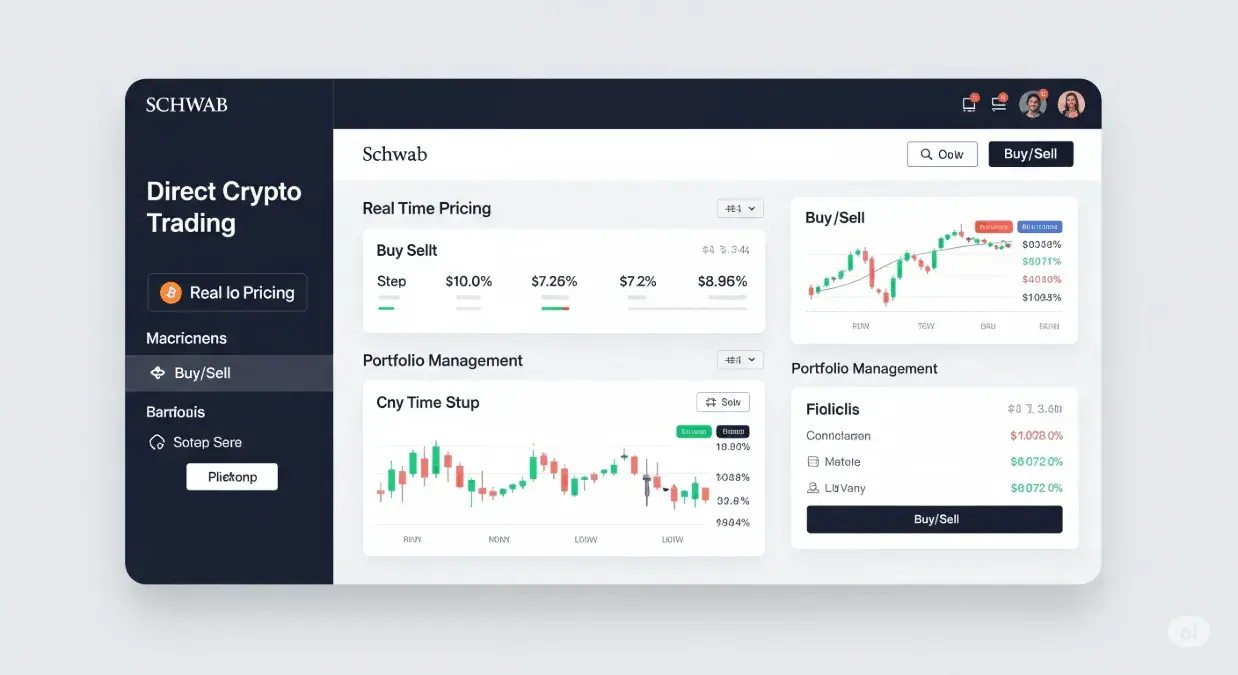American financial giant Schwab is poised to revolutionize how its clients interact with digital assets. In a recent interview on CNBC, CEO Rick Wurster confirmed the company’s intentions to introduce direct trading of Bitcoin and Ethereum on its extensive platform, which currently manages a staggering $7.3 trillion in assets. This significant move comes in response to increasing client demand for a centralized solution to manage their cryptocurrency holdings alongside their traditional investments.
Client Trust Drives Schwab’s Crypto Integration
The decision by Schwab is heavily influenced by the existing crypto engagement of its substantial customer base. Wurster revealed that company clients already account for over 20% of the entire crypto Exchange Traded Product (ETP) market, demonstrating a significant existing interest in digital assets.
Despite this considerable exposure through indirect investment vehicles, a substantial portion of Schwab clients’ crypto holdings remains external to the firm. Of the $10.8 trillion in total client assets managed by Schwab, approximately $25 billion is held in cryptocurrencies. Wurster explained that this relatively modest ratio within company is primarily because clients hold the vast majority of their digital assets – around 98% – with dedicated crypto businesses, while entrusting Schwab with the lion’s share of their other investments.
This division highlights a key driver behind Schwab’s strategic shift. Wurster emphasized that clients are expressing a strong desire to consolidate their financial portfolios. “They really want to bring it back to company because they trust us. They want us to sit alongside their other assets,” he stated, underscoring the brand loyalty and trust that Schwab has cultivated over the years. This desire for convenience and security within a familiar platform is a powerful force pushing traditional financial institutions like Schwab further into the crypto space.
Easing Regulations Pave the Way for Crypto Access
Schwab’s move into direct Bitcoin and Ethereum trading is also facilitated by a shifting regulatory landscape in the United States. Following the turmoil in the crypto markets, particularly the collapse of FTX, regulators had implemented stricter guidelines for banks’ involvement with digital assets. However, Wurster pointed to a new policy expected in 2025, where the Office of the Comptroller of the Currency (OCC), the Federal Reserve, and the Federal Deposit Insurance Corporation (FDIC) are set to unwind some of these earlier restrictions.
This anticipated easing of the regulatory environment provides banks like Schwab with a clearer and potentially easier pathway to offer crypto-related services, including custody and direct trading. Without the previous regulatory overhang, company can now confidently move forward with its plans to provide clients with the direct spot trading of Bitcoin and Ethereum.
Schwab had previously taken initial steps into the crypto space by offering Bitcoin and Ether exchange-traded funds (ETFs) following approval from the U.S. Securities and Exchange Commission (SEC). These offerings were part of an expanded product suite that included mutual funds, blended ETFs, and existing Bitcoin investment options. However, the upcoming introduction of spot trading will mark a significant expansion, allowing clients to directly buy and sell the underlying digital assets in real-time.
Wurster indicated that Schwab is tentatively targeting April 2026 as the prospective launch date for direct Bitcoin trading. He noted a significant surge in customer interest as a key factor in accelerating these plans, citing a remarkable 400% increase in traffic to the cryptocurrency section of the company website as a clear indicator of growing demand.
Broader Trends: Institutional Interest Fuels Crypto Expansion
Schwab’s decision to embrace direct crypto trading aligns with a broader trend of increasing institutional adoption of cryptocurrency investing. A joint survey released in March by Coinbase and EY-Parthenon highlighted the growing conviction among institutional investors, with findings indicating that they plan to increase their cryptocurrency allocations by a substantial 83% in 2025.
The same report also noted a widening interest beyond just Bitcoin and Ethereum, with Solana and XRP identified as top alternative choices among institutional investors. Furthermore, a significant majority of respondents signaled intentions to allocate at least 5% of their portfolios to crypto assets within the next year. This broadening scope of interest suggests potential future growth opportunities for Schwab as it considers expanding its direct trading offerings beyond the initial focus on Bitcoin and Ethereum.
Stay informed, read the latest crypto news in real time!
Further evidence of the increasing integration of digital assets into mainstream finance comes from a May report by Fireblocks, which revealed that an impressive 90% of institutional companies are either utilizing or experimenting with stablecoins. Nearly half of the respondents reported already using stablecoins for payment purposes, underscoring how digital assets are transitioning from purely speculative investments to integral components of financial operations.

